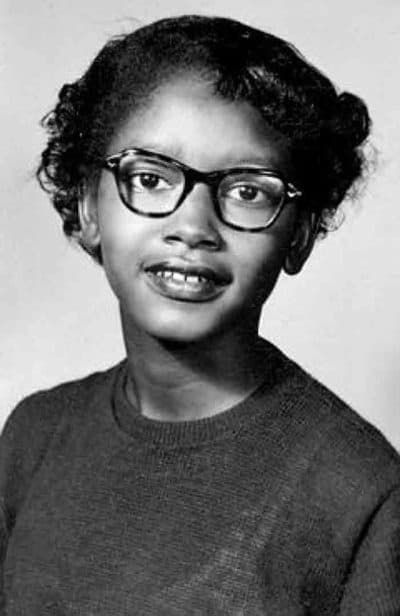
Today is the day people remember Rosa Parks who refused to give up her seat on a bus for a white person on December 1st, 1955. But before Rosa Parks, there was Claudette Colvin.
Nine months before Rosa Parks, there was Claudette Colvin, a 15-year old black girl who was the first person to be arrested for refusing to sit in the back of the bus. The year was 1955. She was one of five women included in a federal court case, Browder v. Gayle (1956), which found that bus segregation in Alabama was unconstitutional. It went to the Supreme Court of the United States and was upheld.
Her achievement went unpublicized because she was a teenager and became pregnant while unmarried. Black leaders worried about her representing their cause.
Colvin grew up in Montgomery, Alabama in 1939 and was a student at a segregated high school. She was returning home from school on the bus on March 2, 1955 where she was sitting in the middle section. Several white people got on the bus and were standing. The bus driver ordered Colvin and three other black men to give up their seats, and move to the back of the bus as was the law. The others complied.
Colvin refused.
She later said that when she was ordered out of her seat, she was thinking about a school paper that she had written that day about a local custom preventing blacks from using the dressing rooms and trying on clothing in department stores.
“I’d moved for white people before,” Colvin said. But this time she was thinking about the slavery fighters she had read about. “The spirit of Harriet Tubman and Sojourner Truth was in me. I didn’t get up.”
Colvin yelled it was her constitutional right during the event. Two police officers were summoned. One kicked her and knocked her books out of her arms as she cried.
-
The Importance of Prayer: How a Christian Gold Company Stands Out by Defending Americans’ Retirement
She was handcuffed, arrested, and forcibly removed. She was convicted of violating segregation law and of assault though she said there was no assault except to her. Her parents came to bail her out. Her father sat up that night with a shotgun in case of trouble.
Colvin said during her trial that talking back to a white person at that time was worse than stealing.
Colvin said in 2005 in an interview:
“I feel very, very proud of what I did. I do feel like what I did was a spark and it caught on. I’m not disappointed,” Colvin said. “Let the people know Rosa Parks was the right person for the boycott. But also let them know that the attorneys took four other women to the Supreme Court to challenge the law that led to the end of segregation.”
Rosa Parks, who nine months later enacted the same event, was a family friend of the Colvin’s. She contributed to Colvin’s defense.
Ms. Colvin never married but did have two sons. She moved to New York after the bus incident and worked as a nurse’s assistant. She lost her eldest son when he was only 37. He lost a battle with alcoholism and drug addiction. She wanted to be a lawyer and that never came to pass.
When asked if she was disappointed in how things turned out, she said, “Yes, I’m disappointed. But then again, no one knows what’s in store for them. At least my grandkids don’t have to suffer what I had to suffer.”
The Colvin family said little about their courageous Claudette because they didn’t want to take away from Rosa Parks as long as she was alive. Claudette said it never bothered her. “I’m not disappointed,” Colvin said. “Let the people know Rosa Parks was the right person for the boycott. But also let them know that the attorneys took four other women to the Supreme Court to challenge the law that led to the end of segregation.”
When Claudette Colvin took her stand, she didn’t have the cameras and the support base Rosa Parks had. She should be remembered and applauded. Rosa Parks was staged and took courage of course, but Colvin’s was just raw courage.


